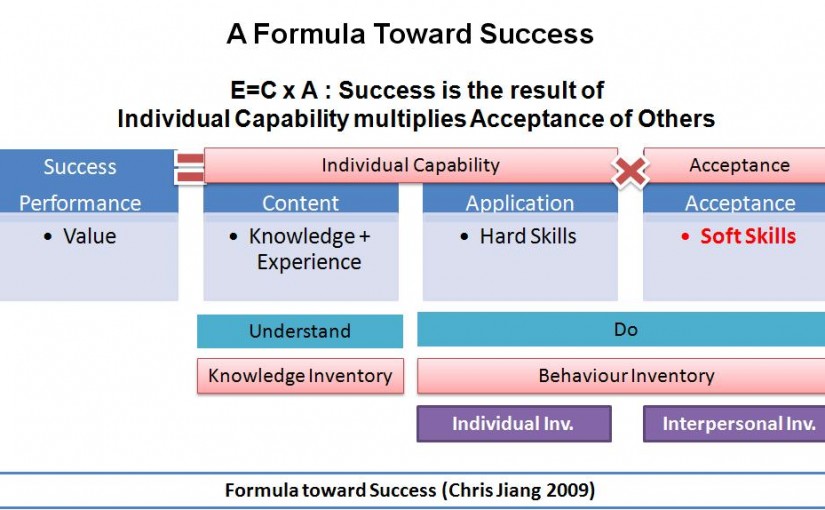Soft skills
From Wikipedia, the free encyclopedia
(Redirected from Soft skill)
Jump to: navigation, search

Formula Toward Success
Soft skills is a sociological term relating to a person’s “EQ” (Emotional Intelligence Quotient), the cluster of personality traits, social graces, communication, language, personal habits, friendliness, and optimism that characterize relationships with other people.[1] Soft skills complement hard skills (part of a person’s IQ), which are the occupational requirements of a job and many other activities.
“软技能”其实是“情商”(EQ: Emotional Intelligency Quotient)的社会学术语,它由一系列能够反映个人特质的要素组成,这些要素包括一个人的人格特质、社交能力、与人沟通的能力、语言能力、个人行为 习惯、待人友善、积极乐观等等。“软技能”与那些作为一份工作硬性要求并能够部分反映一个人智商的“硬技能”,是互补的。
A person’s soft skill EQ is an important part of their individual contribution to the success of an organization. Particularly those organizations dealing with customers face-to-face are generally more successful if they train their staff to use these skills. Screening or training for personal habits or traits such as dependability and conscientiousness can yield significant return on investment for an organization.[2] For this reason, soft skills are increasingly sought out by employers in addition to standard qualifications.
一 个人的“软技能(情商)”可在一个组织的成功中扮演非常重要的角色。任何组织,特别是那些涉及与客户面对面交流的组织,如果他们培训其工作人员使用这些技 能,一般都能够取得更大的成功。对员工的个人习惯或个性如“互赖”(注:《高效能人士的七个习惯》中指出,“互赖”是比“独立”更高层的习惯)和“自觉” 等进行筛选和培训,往往能够为组织产生显著的回报。正是由于这个原因,“软技能”日益成为各类雇主除“标准任职资格”外,对员工技能要求的重要部分。
It has been suggested that in a number of professions soft skills may be more important over the long term than occupational skills. The legal profession is one example where the ability to deal with people effectively and politely, more than their mere occupational skills, can determine the professional success of a lawyer.[3]
有人认为,长期来看,“软技能”要比“硬技能”更为重要。比如在法律界,一名律师,其有效处理人际关系的能力,要比其所拥有的“硬技能”即对法律的了解程度,对其是否能够获得成功更具有决定意义。
Examples of soft skills软技能的例子
* Participate in a team (see team building)参与团队
* Lead a team (see leadership)领导团队
* Unite a team amidst cultural differences组织有文化差异的团队
* Teach others教授他人
* Provide services提供服务
* Negotiate谈判
* Motivate others激励他人
* Make decisions作出决策
* Solve problems解决问题
* Observe forms of etiquette遵守礼仪
* Interact with others与他人互动
* Maintain meaningless conversation (small talk)与他人进行无实质意义的谈话
* Maintain meaningful conversation (discussion/debate)与他人进行有实质意义的谈话-讨论/辩论等
* Defuse arguments with timing, instructions and polite, concise language以礼貌的方式言简意赅地化解争议
* Feign interest and speak intelligently about any topic对任何话题表示兴趣并机智地谈论
————————————————————————————————


